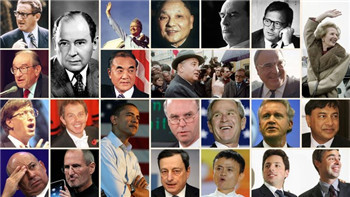
For 45 years, the world has been a strange and uneven place, if the FT’s choices of Person of the Year are anything to go by.
如果说英国《金融时报》年度人物(Person of the Year)的评选结果可以为我们对这个世界的判断提供一些参考的话,那么可以说,这个世界45年来一直是一个奇怪的不平衡之地。
All but two of the 42 individuals chosen since 1970 — Margaret Thatcher in 1987 and Angela Merkel this year — have been men. The first holder of the title was Jean Rey, an unmemorable president of the European Commission. And it took 13 years for the world’s leading business publication to grant the title to a business figure — John Opel, chairman of IBM, whose tenure in fact marked the high point of the group’s dominance of computing.
1970年以来,英国《金融时报》评选出的42位年度人物中,除1987年的玛格丽特鈠切尔(Margaret Thatcher)和今年的安格拉默克尔(Angela Merkel)这两人以外,其余全都是男性。首位年度人物得主是一位不太出名的欧盟委员会(European Commission)主席——让雷伊(Jean Rey)。13年后,这家世界领先的商业刊物才又一次选出一位商界人士——时任IBM董事长的约翰攠楙尔(John Opel)。在奥佩尔任职时期,IBM对计算技术业的主导实际上达到了巅峰。
That said, the choices of the past four-and-a-half decades — made annually by FT writers and editors — do have a solid overall shape and logic.
尽管如此,过去45年的年度人物评选结果整体上的确有清晰的面貌和逻辑。年度人物每年由英国《金融时报》的记者和编辑选出。
The 1970s and 1980s were years of high international politics, dominated by globally recognised diplomats and politicians such as Henry Kissinger, Helmut Schmidt, Mitterrand and Thatcher herself. The FT may have missed Pope John Paul II, who earned a mention in 1979, when it was decided that no one deserved to be Person of the Decade. But 10 years later, it was impossible to argue with the judgment that Mikhail Gorbachev “towered over all others on the international stage” to take that title for the 1980s.
上世纪70年代和80年代是国际政治的风云时代,其中唱主角的是亨利蘒魗格(Henry Kissinger)、赫尔穆特施密特(Helmut Schmidt)、弗朗索瓦密特朗( Mitterrand)以及撒切尔本人等享誉全球的外交官和政治家。英国《金融时报》可能漏掉了教皇约翰保罗二世(Pope John Paul II),他在1979年曾获得“十年人物”提名,不过那年的评委们最终认定无人有资格获此殊荣。但是10年后,米哈伊尔戈尔巴乔夫(Mikhail Gorbachev)“击败国际舞台上的其他所有人”,当选上世纪80年代的“十年人物”时,这个结果是无可争议的。
Similarly, in the 1990s and early 2000s globalisation, relative political stability and economic growth made it impossible to ignore powerful business figures, from Bill Gates, via Rupert Murdoch, to Steve Jobs and Google’s Sergey Brin and Larry Page. The list also nods to the emergence of ambitious economic powers in China (Deng Xiaoping, Jack Ma) and India (Lakshmi Mittal).
同样,在上世纪90年代和2000年代初的全球化时期,政局相对稳定、经济保持增长,让人们无法忽视影响力巨大的商界人物。从比尔盖茨(Bill Gates)、鲁珀特默多克(Rupert Murdoch),到史蒂夫吠布斯(Steve Jobs)以及谷歌(Google)的谢尔盖布林(Sergey Brin)和拉里椠奇(Larry Page),都曾当选英国《金融时报》的年度人物。当选名单中也没有漏掉中国(邓小平和马云)和印度(拉克希米猠呼尔(Lakshmi Mittal))出现的抱负远大的经济人物。
Arguably, we went too soon with Tony Blair, George W Bush, even Barack Obama, all of whom were named man of the year early in their terms of office. An understandable and ever-present wariness about rewarding pure evil prevented Osama bin Laden being named in 2001. And the legacy of many of the business people in the list continues to be open to disruption.
托尼布莱尔(Tony Blair)、小布什(George W Bush),乃至巴拉克攠巴马(Barack Obama)或许都过早地当选了年度人物——他们都在任期初期就荣获这一称号。出于可以理解、并且始终存在的谨慎,奥萨马本拉登(Osama bin Laden)这个纯粹的恶魔没有成为2001年的年度人物。当选名单上不少商界人物的遗产仍容易被颠覆。
But given that this annual election is always hostage to later political, economic, corporate and personal misfortune, it is surprising how many of the choices still stand up to scrutiny.
不过还有不少当选人物至今当之无愧。鉴于后来的政治、经济、企业和个人方面的事态发展难以预料,导致这种年度评选总是有其风险,这一点挺让人意外的。
Take the coronation of John von Neumann as the FT’s Man of the Century in 1999. It was an unexpected choice. But, as the late Peter Martin wrote in his great portrait of the Budapest-born polymath, von Neumann “devoted himself with ferocious energy… to some of the central issues of the age”, such as mathematical theory, the atomic bomb, economics and the creation of the computer. Given the role technological advances, global conflicts and economic turmoil have played in shaping the 21st century world since, the selection actually looks rather prescient.
以1999年约翰冯诺伊曼(John von Neumann)当选英国《金融时报》“世纪人物”为例。这当时是一个出乎人们意料的选择。但是正如已故的彼得氠丁(Peter Martin)用精彩的文字所描述的那样,这位出生于布达佩斯的博学家“以充沛的精力投身于……研究当代一些核心问题”,比如数学理论、原子弹、经济学以及计算机的发明。鉴于自那以后技术进步、全球冲突以及经济动荡在塑造21世纪世界中扮演的角色,那次的评选结果事实上看起来相当有先见之明。












